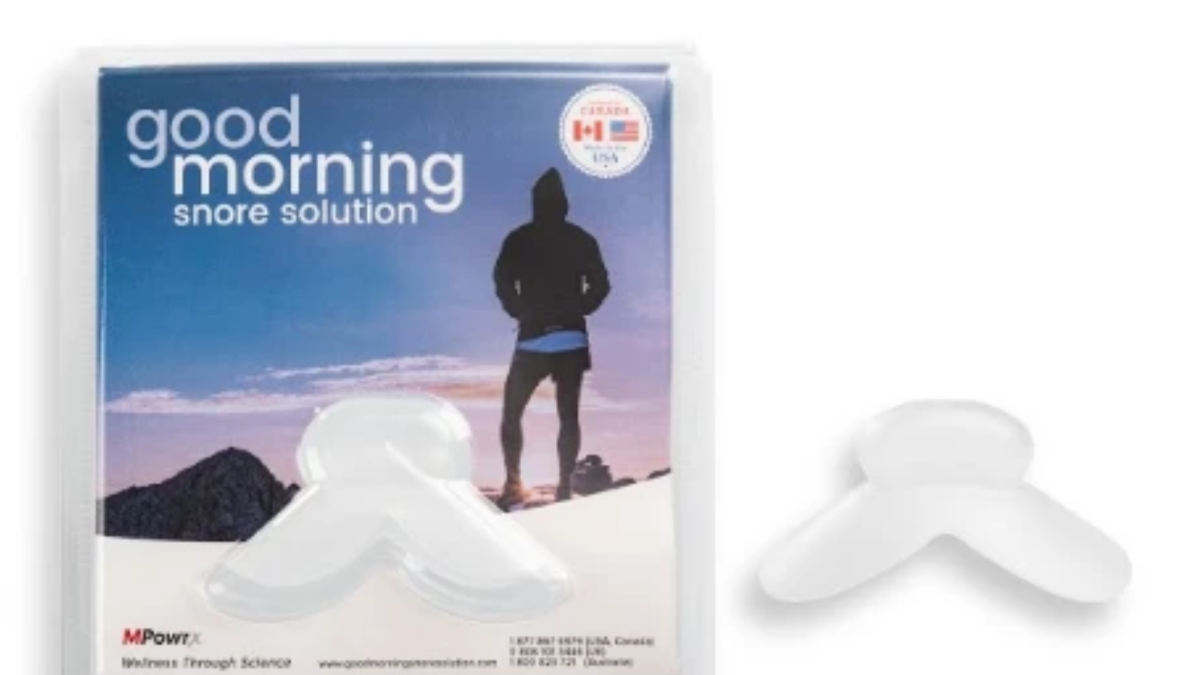Why Do People Snore?
How To Treat Chronic Snoring
It's important to consult your doctors with any medical concerns, and before making any changes or adding supplements to your health plan.
It is a date night. You and your partner have enjoyed a lovely evening of butternut squash risotto, grilled lamb chops and white wine. There was laughter and talk all evening and both of you feel great that you were finally able to do this again amid the pandemic.
The two of you head up to the bed and tuck in for the night. You're not that sleepy yet so you try to catch whatever's on cable at the moment. Then you hear it. A snore. A loud, bothersome snore.
You try to turn the volume up a little to hear what they're trying to say but this wakes them up and they ask you to turn the TV down and let them sleep. You turn it down and they are noisily snoring away again. It turns into a vicious cycle until you are able to find the perfect volume that doesn't wake them up yet is still fairly audible.
You barely get any sleep that night and you feel stumped as you're staring at the blank television screen. Why is it that sometimes they snore but sometimes they don't? What causes it and how can I make it go away?
What Is Snoring?
Snoring is the hoarse sound that you emit when air rushes past the relaxed tissues in your throat. This is the noisy breathing that is a result of vibrating tissues as you breathe.
Snoring is a common condition that can affect anyone, although it has been found to be more prevalent in men and people who are overweight. Snoring can happen every once in a while or it can happen every time you sleep. It also tends to get worse with age.
Mostly, snoring affects the people around you who you keep awake rather than the snorer themself. However, if you're a long-term snorer, you may be hurting your own sleep quality along with the sleep patterns of your roommates.
Causes of Snoring
Snoring happens when the airflow through your mouth and nose is blocked. Some causes of blocked airflow include:
- Alcohol and drug use: Snoring can be brought on by consuming too much alcohol before bedtime. Alcohol relaxes the throat muscles and lowers your natural defenses versus the airway blockages. Drugs that act as muscle relaxers can also cause your tongue and throat muscles to relax too much.
- Blocked nasal airways: Some people snore only when allergy season comes or when they get a sinus infection.
- Long soft palate and/or uvula: A long soft palate or a long uvula (the dangling tissue in the back of your mouth) can cause the opening from your nose to your throat to narrow. When you breathe, the narrowed passageway causes them to vibrate and bump against one another and blocks your airway.
- Sleep deprivation: Not getting enough sleep at night might cause your throat muscles to relax too much.
- Sleep position: Sleeping on your back can make you snore.
Complications
Habitual snoring may be more than just a nuisance for other people who can hear you. Snoring can be a symptom of obstructive sleep apnea. You may also be at risk for other complications, including:
- Frequent waking from sleep: You may not even realize you have been waking up at odd intervals in the night but you may find your feelings of daytime sleepiness increasing.
- A strain on your heart: Long-term obstructive sleep apnea often increases blood pressure and may cause your heart to get bigger, creating higher risks of heart attack and stroke.
- Frequent frustration or anger: Having a poor night's sleep can make you irritable without noticing that you've been crankier than usual lately.
- Difficulty concentrating. Without feeling revitalized from sleep and not feeling rested for a long time, you may find yourself wandering off more. There is an increased risk of motor vehicle accidents due to lack of sleep.
Treatment for Snoring
- Lifestyle changes: You might benefit from losing some weight. Make sure that your BMI stays within the healthy range. Also, you should refrain from drinking alcohol before bed.
- Surgery: Several kinds of procedures can help stop snoring. Depending on your doctor, they might suggest removing or shrinking tissues in your throat or making your soft palate stiffer.
- CPAP: Investing in a continuous positive airway pressure machine will treat sleep apnea and might reduce your snoring by blowing air into your airways as you sleep.
- Oral appliances: This option might be the cheapest and most feasible decision for some. The snorer needs to wear a small plastic device in their mouth as they sleep and this tool will keep the airways open by continuously moving the jaw or tongue.
Good Morning Snore Solution
The Good Morning Snore Solution mouthpiece is a simple one-piece, noncustom oral appliance. The mouthpiece can be comfortably retained within the mouth while sleeping. The device has a flange that fits between the lips and teeth and a bulb with an aperture (opening) that holds the tongue. Once the bulb is squeezed to reduce the air volume, a vacuum is formed which keeps the tongue comfortably retained within the bulb. It is this forward retention of the tongue that helps keep the upper airways open, which in turn reduces snoring.
The Good Morning Snore Solution Mouthpiece is made of a plastic resin commonly used in the fabrication of oral appliances. This resin has undergone ISO-certified medical device testing to confirm the material is safe for its intended use and has been cleared by the FDA for this purpose; the material is free of BPA and BHA.
Wake up to great mornings when you stop snoring with the Good Morning Snore Solution Mouthpiece!
We may earn a commission from links on this page, but we only recommend products we back. Newsweek participates in various affiliate marketing programs, which means we may get paid commissions on editorially chosen products purchased through our links to retailer sites.





